Last Updated: 2 days ago
Do you have a cat that sprays? If so, you know how unpleasant the smell can be.
Not only is it embarrassing when guests come over, but getting rid of the cat spray smell can also be a big challenge.
In this post, we’ll cover why do cats spray, what to do if your cat is spraying all over the walls and furniture, and how to stop it.
So if you’re looking for ways to get rid of the cat spray smell, keep reading!
Why Do Cats Spray?
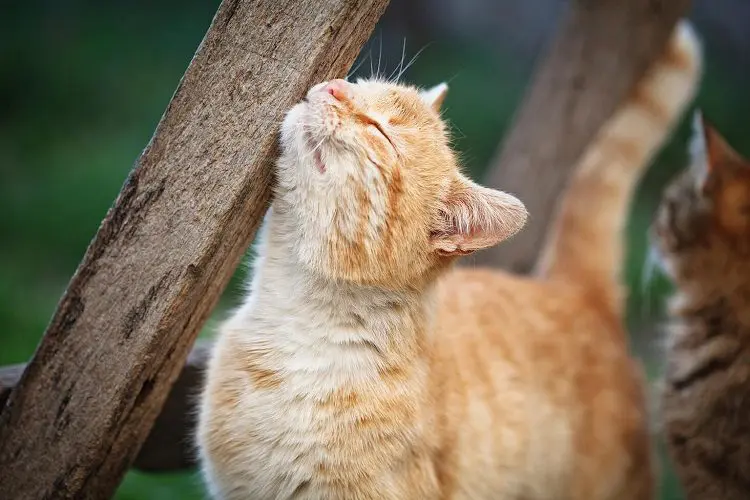
- Territorial Marking
- Sexual Behavior
- Stress or Anxiety
- Medical Issues
- Social Hierarchy
- Litter Box Problems
- New Additions
- Marking Personal Items
- Outside Influences
- Unneutered Cats
Cats spray for a variety of reasons, but the most common is to mark their territory. Cats are territorial animals, and spraying helps them establish boundaries with other cats in the area.
Spraying also serves as a way for cats to communicate with each other, express frustration or stress, or even show affection.
When it comes to marking their territory, cats will often target specific objects such as furniture, walls, and doors.
They may also spray on items that have been recently moved around in order to let other cats know they’ve claimed them as their own.
If your cat has started spraying indoors, then it could be because there are too many cats in the house competing for space and resources.
This can cause stress, which leads them to spray more frequently. Spraying can also be triggered by changes in routine, such as moving house or introducing new cat into the home.
These events can cause anxiety, which results in increased spraying behavior from your cat. It’s important not to punish your cat if they start spraying inside.
Instead, try providing extra attention and reassurance during times of change so that they feel secure enough not to resort to bad behavior out of fear or insecurity.
If you think that your cat is displaying signs of distress due to environmental changes, make sure you take steps towards creating a comfortable environment where they feel safe and secure.
Provide plenty of hiding places so that they can retreat when feeling overwhelmed by unfamiliar surroundings.
Ensure there are plenty of scratching posts available so that they don’t need to turn to the furniture.
How to Get Rid of Cats Spray Smell
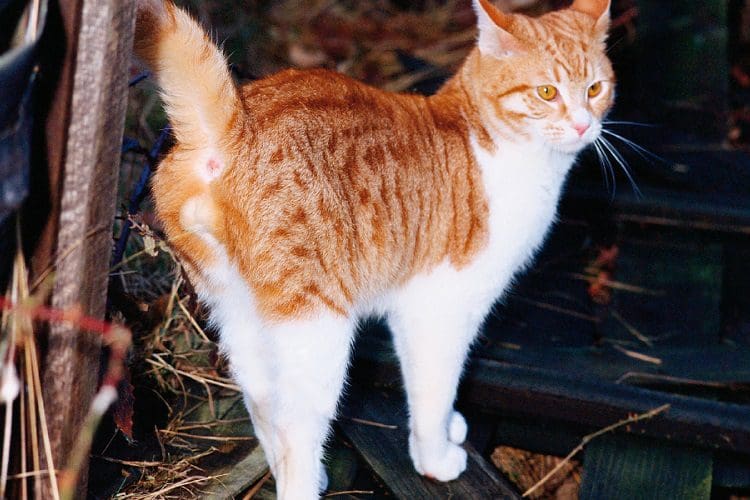
If you’re a cat owner, chances are you’ve had to deal with the unpleasant smell of cat spray.
Cat urine contains bacteria that can cause health problems for humans and pets alike, so it’s important to clean up any messes quickly and effectively.
Fortunately, there are some simple steps you can take to get rid of the odor and keep your home smelling fresh.
1. Blot the Area With a Paper Towel or Cloth
Start by blotting up as much liquid as possible with a paper towel or cloth.
This will help absorb most of the urine before it has time to soak into furniture or flooring.
2. Apply Pet-Safe Cleaner or White Vinegar Diluted in Water
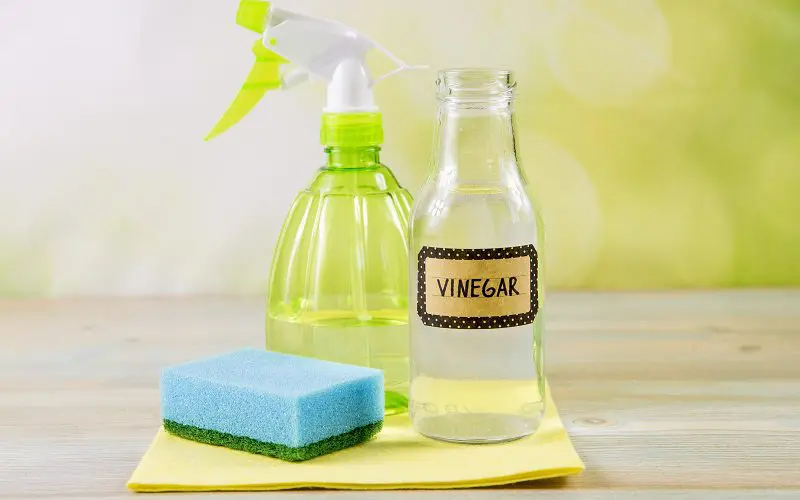
Buy an enzymatic pet cleaner that is designed specifically for neutralizing pet urine or make your own solution by mixing one part white vinegar with two parts warm water in a spray bottle.
Spray this mixture onto the affected area and let sit for 10 minutes before wiping it away with a damp cloth.
Be sure not to scrub too hard as this could damage fabric fibers!
3. Rinse Well
Rinse off any remaining residue until all traces have been removed from the surface.
This will ensure that your pet doesn’t end up re-marking its territory.
How to Stop A Cat from Spraying
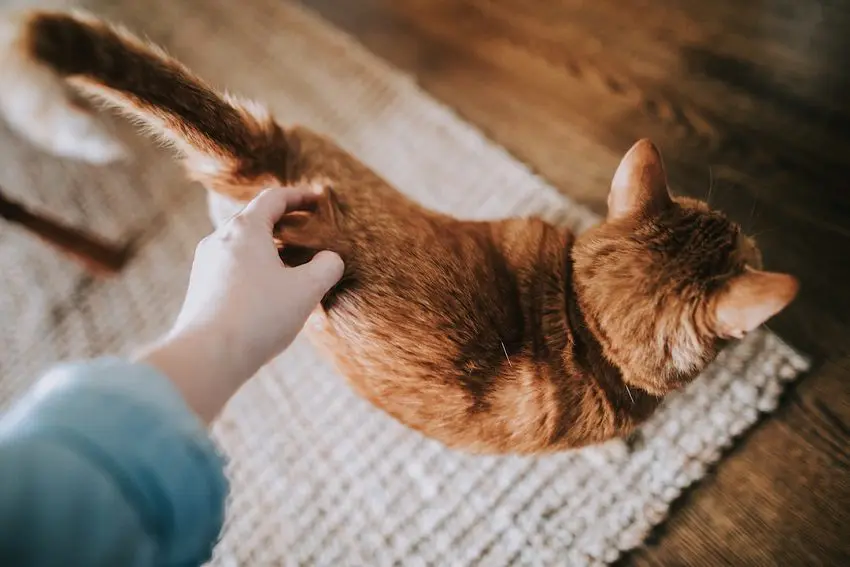
No matter how disgusted you feel on the inside, spraying is a normal thing for a cat to do.
But there are a couple of things you can do to prevent your cat from spraying.
1. Have Your Cat Spayed or Neutered
The first step in preventing your cat from spraying is having them spayed or neutered by six months of age.
This will reduce the urge to spray as they won’t feel the need to mark their territory if they don’t have hormones driving them to it.
It’s also important for overall health and well-being. Spaying and neutering help prevent certain types of cancer and other diseases associated with intact cats.
2. Provide Plenty of Litter Boxes

It’s important that each cat has its own litter box plus one extra so that all cats have access when needed.
Additionally, make sure these boxes are kept clean. Just like us humans, cats don’t like using dirty toilets!
If possible, try placing several litter boxes around the house so your kitty always has easy access no matter where they are in the home.
3. Give Your Kitty Lots of Love and Attention
Happy cats tend not to feel the need to mark their territory as much as those who lack affection or stimulation.
Spend time playing together every day (even if it’s only 10 minutes), brush their fur regularly, and provide plenty of scratching posts and toys.
Anything that keeps them entertained keeps them from spraying.
4. Reduce Stress
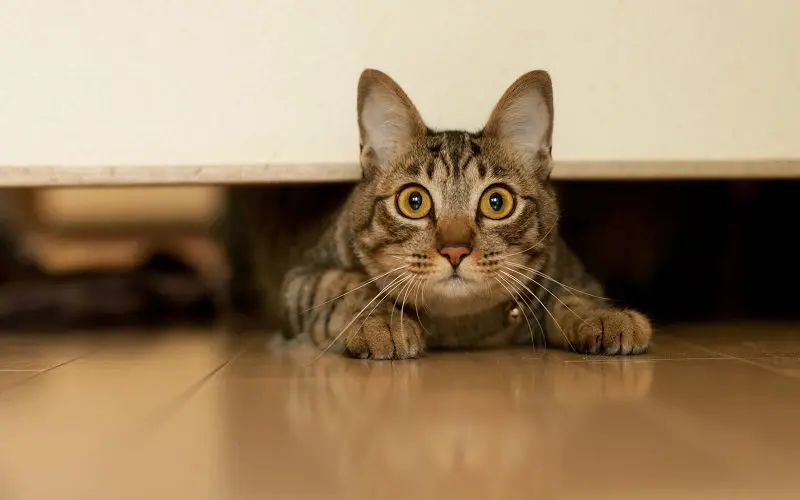
Veterinarians say that anxiety and stress trigger spraying in neutered or spayed cats.
So, think about your home situation. Has something changed recently?
Maybe you’ve brought another cat/dog into the picture, or you’ve just had a baby, or you lost a beloved pet or a family member
All these scenarios will affect your cat negatively. If you want to deal with a cat that sprays, you have to relieve her or his anxiety. Here are some tips:
- Keep stray cats away from your home.
- Ensure that your cat has enough space to roam.
- Block the view from a window if something outside is bothering your cat.
- Introduce new pets slowly and wait for your cat to accept them.
- Talk with your vet about synthetic pheromones like Feliway, or catnip and valerian to calm down your kitty.
- Make sure that you spend enough time with your kitty and that he doesn’t feel neglected.
5. Rule Out a Medical Problem
Spraying is normal behavior for intact cats. However, spraying might also indicate an illness if your cat is neutered or spayed and has never sprayed before.
It’s never a mistake to take your cat to the vet if you think something might be wrong. What’s more, sometimes you think that your cat is spraying, but he might have difficulty urinating.
Tomcats sometimes get urinary obstructions due to the anatomy of their urinal tracts. As a result, toms might not be able to urinate, or they might pass a small amount of urine.
Usually, a cat sprays vertical surfaces such as walls or legs of furniture. You’ll see how the cat quivers his tails and sprays without squatting.
However, if you’re not there to witness the act and you keep finding wet spots on carpets or bedding, you should take your cat for evaluation.
6. Get Rid of The Smell
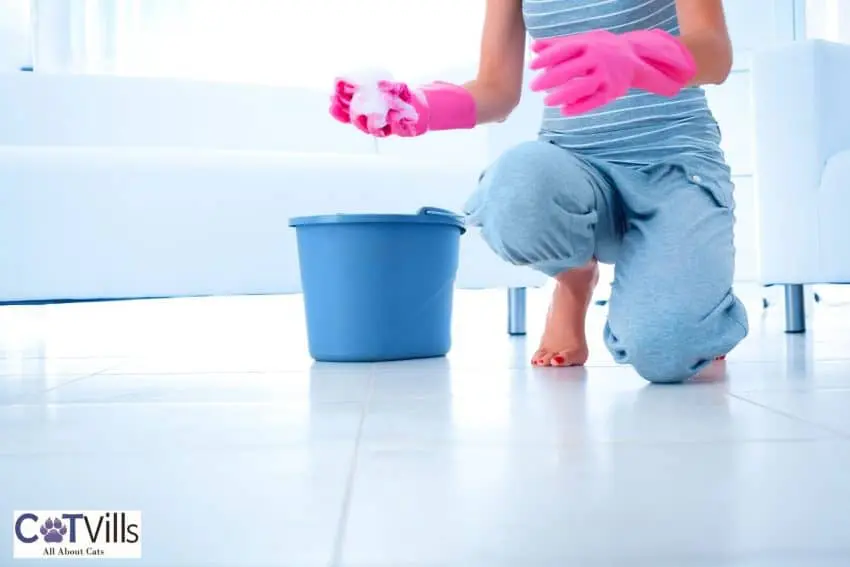
Another way to deal with a cat that sprays is to remove all traces of the urine smell from your house.
Cats get triggered to re-spray the area when they smell it. So, if you don’t clean it so well that the cat can’t smell it anymore, you have a problem.
To eliminate cat urine odors, do the following:
- Locate all the places your cat has marked. You’ll be able to smell most of them, but you might miss a few. So, get a black light and go through your house.
- Use one part vinegar and one part water to clean the spots. While vinegar smells unpleasant, it’s an acid that breaks down the alkaline salts in the urine.
- As an alternative, you might use a commercial enzyme-based cleaner to get rid of the smell completely.
- Do not use cleaning products based on ammonia because cat urine contains ammonia. So, your Tiger is more likely to spray if you clean with such products.
7. Don’t Punish The Cat
No matter what other cat owners might tell you, punishing a cat is not going to work. For one thing, a cat doesn’t make a connection between the punishment and her wrongdoings.
Your furbaby gets that you’re upset about something, but not exactly what. For another, punishing the cat might make Tiger more anxious.
When Tiger is nervous and scared, he is going to spray again as a stress reliever. So, your “punishments” are counterproductive.
Try to identify the reasons why your cat sprays. If you can’t find a logical explanation, we advise that you consult a cat behaviorist.
When dealing with a cat that sprays, you have to be patient and look at things from your cat’s point of view.
What to Do If Your Neighbor’s Cat Is Spraying
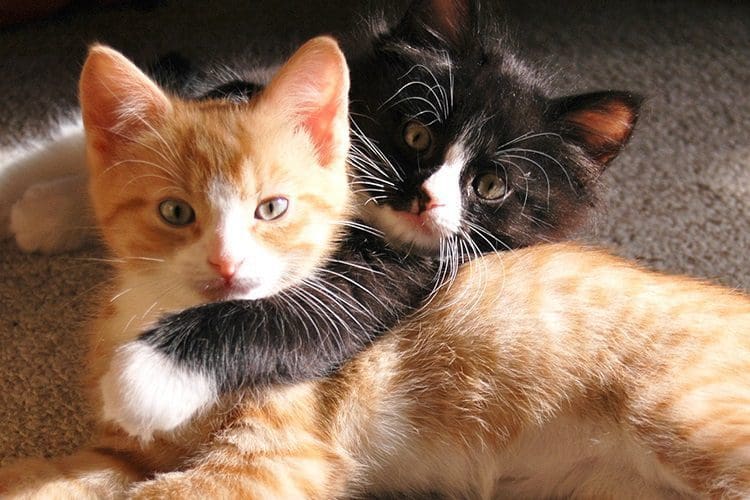
But what do you do when it’s not your cat that’s doing the spraying? What if it’s your neighbor’s cat?
It can be difficult to handle this situation but there are some steps you can take to help resolve the issue.
1. Talk to Your Neighbor
Explain the problem and see if they are willing to work together on finding a solution.
It may be helpful for both of you if they understand why their pet is behaving this way and what needs to be done in order for them to stop it from happening again.
2. Set Up Deterrents
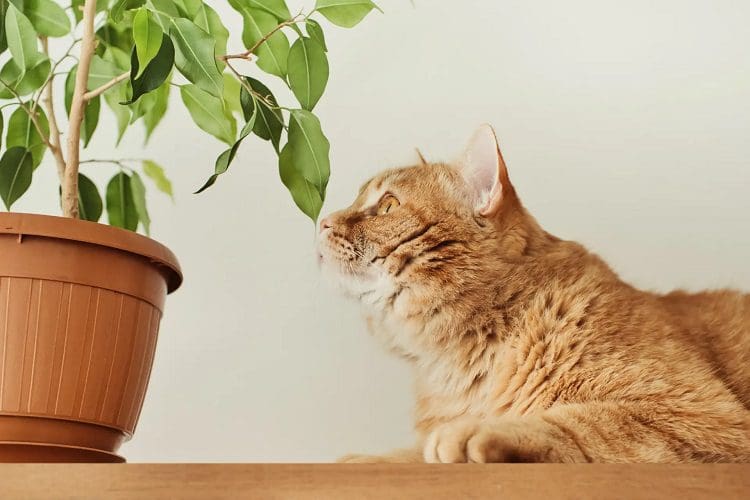
If talking doesn’t seem like an option or isn’t working, then setting up deterrents around the area may discourage them from continuing this behavior.
This could include using an ultrasonic device, water bottle, or water hose as deterrents when they start spraying.
You can also try spreading citrus peels around these areas as cats generally don’t like citrus scents.
3. Spay and Neuter
Having pets spayed or neutered has been proven time and again as one of the most effective ways of preventing unwanted behaviors.
Make sure your neighbors know about this option too!
Conclusion
Now you should know why do cats spray and how to get rid of the cat spray smell. Spraying is a common behavior that can be difficult to manage.
However, by understanding why do cats spray and taking steps to prevent it from happening in the first place, you can help get rid of the foul odor and keep your home smelling fresh.
References:

Olfa knows how to get things done and has a keen business sense that others admire. She’s always on the go, coming up with new ideas! Her ability to anticipate the needs of her readers and deliver information that they want is what makes CatVills such a success. She loves cuddling her cat Picaciu. He is her inspiration.
